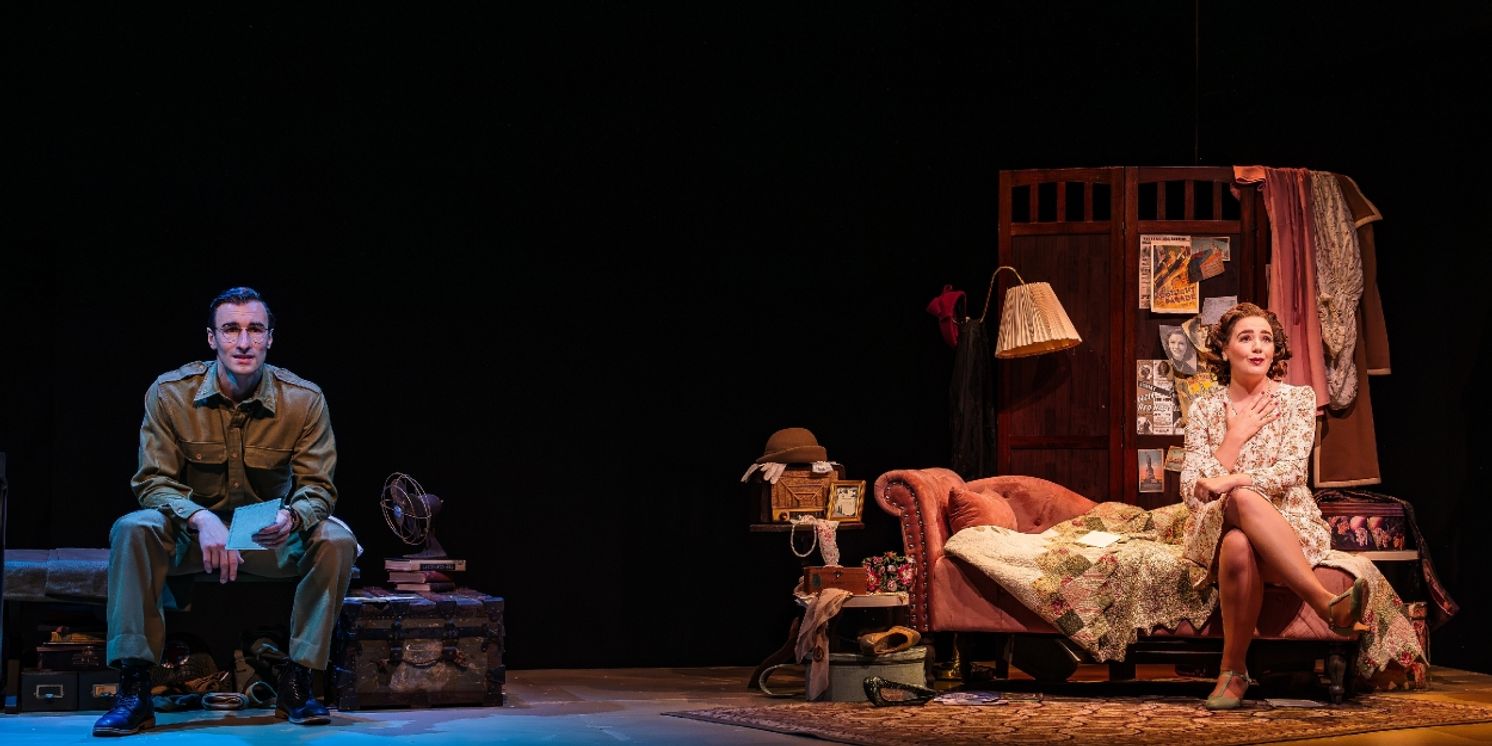Review: DEAR JACK, DEAR LOUISE at Penguin Rep Theatre
A Letter-Perfect Love Story

Imagine there’s no such thing as digital media, so you and those you know don’t own a phone, yet you want to share some personal news with relatives and friends.
Imagine putting pen to paper to share your thoughts, tucking the ink-inscribed stationery into an envelope that you lick to seal the glued flap, slapping a stamp on
the addressed envelope, and depositing the missive in a public mailbox to send it on its merry way.
Imagine that it would take several days for your thoughts to reach the recipient, and
an equal length of time for you to get back a written response.
Imagine a form of intimate, one-to-one correspondence that we ancients fondly remember as letter writing.
Now imagine two people courting across the expanse of a 3,000-mile divide,
separated by a continent, sending each other a letter a week as they come to
know each other, and to learn details about each other’s families.
Finally, imagine this long-distance, relationship continuing for several years
without the uncoupled couple ever meeting in the flesh.
Inspired by the real-life story of how his parents “dated” each other during World
War II, Dear Jack, Dear Louise is the work of award-winning playwright Ken Ludwig, best known for laugh- inducing farces like Lend Me a Tenor, Moon Over Buffalo,
and Crazy for You.
With Dear Jack, Dear Louise, Mr. Ludwig willingly dates himself, to give us a
poignant glimpse into what it was like, 80-plus years ago, to woo someone without benefit of physical connection and with a world war raging. (Dear Jack, Dear Louise runs through Sunday, Aug. 18, at Penguin Rep Theatre in the Rockland County town
of Stony Point (penguinrep.org).
Mr. Ludwig’s setup is storybook simple.
Captain Jacob “Jack” Ludwig (the author’s father, portrayed by Michael Liebhauser)
is a thirtysomething military doctor stationed at a hospital in the northwestern U.S.
He hails from a suburb outside Philadelphia, Pa.
Louise Rabiner (played by Alexandra Fortin) grew up in Brooklyn, N.Y., and is an impassioned, aspiring Broadway singer and dancer living in a Manhattan boarding house for performers. Louise is a few years Jack’s junior.
Their respective parents, who know each other from both their families’ Brooklyn roots, have suggested their progeny reach out to one another, as was a common
form of engagement in those days. As the play begins, Jack and Louise start to
strike up a ping pong game of letter writing to get to know each other more truly
and deeply. The time span covered is 1942-1945.
Due to the novel staging – with each performer staying on their half of the stage
and never looking at each other – there’s little of the conflict between characters that
is a given in stage or screen storytelling.
At the same time, the stark personality contrasts of Jack and Louise are a paean to
the romantic notion that “opposites attract.”
Where Jack is soft-spoken and decorous, Louise is an Energizer Bunny chatterbox who’s forever emoting – she doesn’t need a stage; she is her own stage.
As their relationship evolves, Jack emerges from his dry reticence – Louise is like
a runaway pace car with which Jack must keep up. He surely comes into his own
when he forcefully sends up warning flares about any further meddling in his love life
by his mother’s 11 buddinsky sisters – the poor guy’s coping with a veritable aunt colony.
Mr. Liebhauser and Ms. Fortina display formidable endurance and energy in
rigorously fleshing out their characters. Their highly disciplined, high octane performances – with due credit to savvy director Stephen Nachamie – serve to
offset that the actors don’t lock gazes (save for one emotion-charged moment).
While Mr. Ludwig did not have benefit of borrowing from his parents’ literal letters
in constructing this imagined tete-a-tete – his late mother had long ago jettisoned
them – his concoction does not lack for convincing detail about the principals
and the world they inhabited.
A copious volume of information is woven into the deeply descriptive dialogue that actors and director must deliver as effectively and entertainingly as possible.
Proof that the cast and director succeed in that objective is the frequent sounds
of acknowledgment emanating from the audience – titters of amusement, gasps of surprise, sighs of empathy.
The patrons at Penguin Rep were leaning in all the way – savoring the mid-century period details, the nostalgic name-dropping of throwback celebrities like
Lana Turner and Cary Grant, mention of Broadway landmark shows like Oklahoma
and Arsenic and Old Lace, the reading of a Western Union telegram, Louise working
at the Stage Door Canteen, and the commonplace behavior of letter-writing. We also learn that Jack worked in high school at the local soda fountain where he jerked
root beer floats (that no doubt cost about a nickel).
Act II builds to a tense crescendo, as the escalating war and Jack’s role in it –
backing up the troops as a medic in the D-Day invasion – throws existential doubt
into whether the two lovebirds ever will be in the same place at the same time.
Without spilling any spoilers, rest assured that the breathless ending will not disappoint.
P.S. Penguin Rep Theatre Founding Artistic DirectorJoe Brancato told me that
each year he gifts young family members stationery with which they handwrite messages to keep him updated on their activities. While the penmanship might
not be the most legible, he says, it warms him to see them adapt, if only
momentarily, to a “new” form of communication.
Pictured: Michael Liebhauser (left) and Alexandra Fortin are the titular stars of
Dear Jack, Dear Louise, at Penguin Rep Theatre through Aug. 18. Photo by Dorice Arden Madronero
Reader Reviews

Videos

